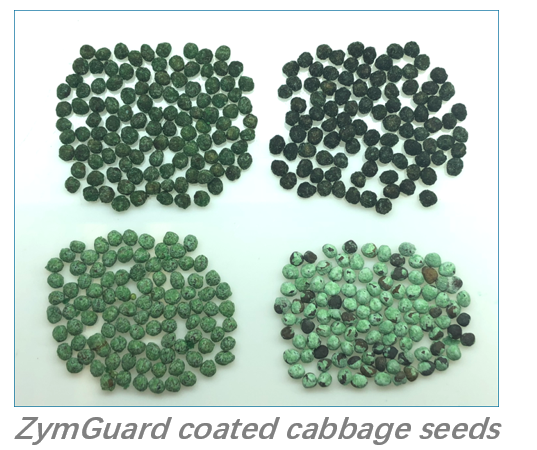Agrochemicals
Radically efficient crop protection 5th August 2019
By Marie Donnelly, Plant Protection Lead at Zymtronix Catalytic Systems
Patented enzymes can kill pathogens when and where it matters, says Marie Donnelly, Plant Protection Lead at Zymtronix. New

Patented enzymes can kill pathogens when and where it matters, says Marie Donnelly, Plant Protection Lead at Zymtronix. New technology uses biological solutions to meet the needs of an agricultural industry that must improve sustainability, without hurting productivity.
Zymtronix, the leader in next-wave biocatalysis, recently announced the launch of its daughter company Agrynex, for ‘radically efficient crop protection’. Using patented enzymes to kill pathogens when and where it matters, the new technology is well poised to meet the needs of the agriculture industry as it moves towards increasing use of biological solutions. As progressively more pesticides are withdrawn by regulatory bodies, these bio-alternatives will play an increasingly important role in agriculture, while helping to preserve the world’s natural resources.
The idea came about in 2015, when the company was stabilizing an enzyme system known to have biocidal properties. Realising there could be an application in crop protection to fight plant pathogens, the research team reached out to a plant pathologist at Cornell’s Plant Science Building (Zymtronix is based on campus at Cornell), asking for a sample of a common crop pathogen. Subsequent work led to the development of a broad spectrum, immobilized enzyme product that is effective against both fungal and bacterial pathogens. It is not specific to any pathogen, and yet it is not harmful to the crop plant and other non-target organisms.
How does it work?
The core technology underlying Agrynex’s crop protection products finds its roots in Zymtronix’s enzyme stabilization platform. The parent company has made its name by optimizing enzyme immobilization to improve the productivity and sustainability of processes across the agricultural and ingredient manufacturing sectors. Now, this technology is being used to stabilize a broad-spectrum antimicrobial enzyme system on biodegradable scaffolds.
The core technology underlying Agrynex’s crop protection products finds its roots in Zymtronix’s enzyme stabilization platform. The parent company has made its name by optimizing enzyme immobilization to improve the productivity and sustainability of processes across the agricultural and ingredient manufacturing sectors. Now, this technology is being used to stabilize a broad-spectrum antimicrobial enzyme system on biodegradable scaffolds.
The enzyme system used by Agrynex is naturally occurring in saliva and milk, and is the first line of defence for higher organisms against microbial infection. It creates a free-radical attack that is detrimental to microorganisms. When the enzymes are immobilized and the products of their reactions are concentrated, a localized area of oxidative stress is created. This damages the pathogens’ cell walls and membranes, and inhibits several processes necessary for pathogen survival, including respiration and transport.
At high concentrations, the product kills fungi, bacteria and nematodes. At a lower rate of application, it weakens the pathogen and can be co-formulated with existing antimicrobials that have more specific modes of action, either conventional or organic, providing more crop protection with fewer (or even no) chemicals. This is a game changer for the field, which has historically relied on more chemicals to achieve adequate protection against pathogens.
Resisting resistance
Many existing antimicrobials use a single mode of action to eliminate pathogens, and resistance emerges when a population evolves that can resist that single mode of action. In contrast, the damage caused by oxidative stress is spread across many different parts of the cell, involving many different proteins. This means a successful resistance strategy would require pathogens to undergo multiple simultaneous mutations, making it much more unlikely.

Application
The product will be used in multiple commercial applications that act on or around the plants (at no point does it enter the plant or the food chain).
The product will be used in multiple commercial applications that act on or around the plants (at no point does it enter the plant or the food chain).
- A seed disinfection solution, ZymPure, to be used by seed companies before they distribute their product, in order to clean their seeds of any pathogens they may have picked up during production or shipping.
- A seed coat, ZymGuard, that will work in the soil immediately surrounding the seed, creating a pathogen free environment for germination. The application materials have been engineered to persist around the seed or surface without being washed away.
- A crop spray, to address pathogen infection on the leaf surface. This is still at development stage, and will require extra engineering effort to convert existing, effective formulas to a spray that will spread quickly on the leaf surface and persist for an extended period.
The product is biodegradable after the antimicrobial reaction, allowing beneficial environmental microbes to reestablish and support the growing plants. Field trials have shown that the product does not inhibit seed germination or vigor, and by controlling pathogens in the soil it significantly boosts the chance of seed germination, even in heavily infested soil.
What’s next?
To fulfil its mission to protect organic and conventional crops using its patented stabilized enzyme technology, Agrynex has more field trials planned to demonstrate the effectiveness of the product on more crops. Ultimately, the goal is to demonstrate efficacy across a broad array of crops against as many pathogens as possible, for registration and commercialization.
Agrynex is looking for strategic partners who are interested in co-formulating their products with the new immobilized enzyme system, for more crop protection with a lower chemical load.
Author:
Marie Donnelly, Plant Protection Lead at Zymtronix Catalytic Systems, The McGovern Center, 526 Campus Road, Ithaca, NY 14853, USA
E: info@agrynex.us
E: info@agrynex.us



